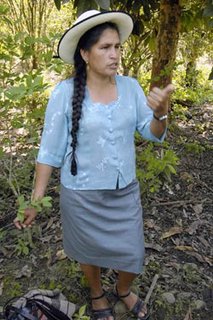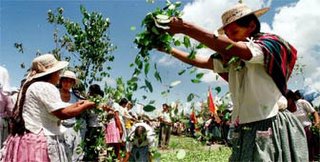-- Selective Diplomacy --
The Bolivian government has expressed concern at the United States' revocation of a travel visa to a popular Bolivian Senator "on suspicion of terrorism". President Evo Morales criticized the United States on Thursday for canceling the visa of one of his closest confidants in the first diplomatic incident with Washington since taking power a month ago.
 Senator Leonilda Zurita-Vargas, told local media that U.S. State Department officials had told her she was considered a terrorist, something she has called "an offense against Bolivian women".
Senator Leonilda Zurita-Vargas, told local media that U.S. State Department officials had told her she was considered a terrorist, something she has called "an offense against Bolivian women".
In Washington, State Department Deputy Adam Ereli said Zurita's visa was revoked without notification on May 7, 2004, after the U.S. government received "information" about her.
For the Bolivian press, it is the accusation of collusion with Colombian citizen Francisco "Pacho" Cortes (falsely accused of terrorism by the former Bolivian Government) that stripped the Senator of her visa. For others, it is construed as retaliation by the Bush administration against the new government of Bolivia for it's positions on Coca eradication and immunity for US troops guilty of crimes against humanity.
Senator Zurita-Vargas had scheduled a trip that would have included speaking engagements at Stanford University, the University of Vermont, and the University of Florida at Gainesville, culminating in a speech at the Kennedy School of Government at Harvard University.
Like Morales, Zurita-Vargas' roots can be traced to early advocacy work that she did for coca growers in the Chapare region, and the prominence she gained as a leader of the anti-coca eradication protests in 2002-2003. In last December's national elections, she joined Morales' MAS party and won election as a Senator from Cochabamba, largely because of her leadership in the social sector.
Zurita-Vargas' has flown to the U.S. four previous times. Her most recent visit was to participate in various events, including an appearance at Harvard University in late February of 2003.
"Defending coca for us is defending our land, it's the same struggle. It's defending our culture, our health," said Leonilda Zurita-Vargas, then a congresswoman & leader of the National Federation of Women Campensinos in Bolivia. "We are fighting against the eradication of our culture", speaking in Spanish with an English translator at the Center for International Development.
 Senator Leonilda Zurita-Vargas, told local media that U.S. State Department officials had told her she was considered a terrorist, something she has called "an offense against Bolivian women".
Senator Leonilda Zurita-Vargas, told local media that U.S. State Department officials had told her she was considered a terrorist, something she has called "an offense against Bolivian women".In Washington, State Department Deputy Adam Ereli said Zurita's visa was revoked without notification on May 7, 2004, after the U.S. government received "information" about her.
For the Bolivian press, it is the accusation of collusion with Colombian citizen Francisco "Pacho" Cortes (falsely accused of terrorism by the former Bolivian Government) that stripped the Senator of her visa. For others, it is construed as retaliation by the Bush administration against the new government of Bolivia for it's positions on Coca eradication and immunity for US troops guilty of crimes against humanity.
Senator Zurita-Vargas had scheduled a trip that would have included speaking engagements at Stanford University, the University of Vermont, and the University of Florida at Gainesville, culminating in a speech at the Kennedy School of Government at Harvard University.
Like Morales, Zurita-Vargas' roots can be traced to early advocacy work that she did for coca growers in the Chapare region, and the prominence she gained as a leader of the anti-coca eradication protests in 2002-2003. In last December's national elections, she joined Morales' MAS party and won election as a Senator from Cochabamba, largely because of her leadership in the social sector.
Zurita-Vargas' has flown to the U.S. four previous times. Her most recent visit was to participate in various events, including an appearance at Harvard University in late February of 2003.
"Defending coca for us is defending our land, it's the same struggle. It's defending our culture, our health," said Leonilda Zurita-Vargas, then a congresswoman & leader of the National Federation of Women Campensinos in Bolivia. "We are fighting against the eradication of our culture", speaking in Spanish with an English translator at the Center for International Development.

Taking the coca leaf off the United Nations' Single Convention on Narcotic Drugs list was one of the main planks of Morales' election campaign. His anti-eradication moves as president are being followed closely, not only by his constituency in Bolivia but also in Colombia and Peru, where there are fledgling coca-based legal industries.
Labels: Evo Morales Bolivia CNASD


<< Home